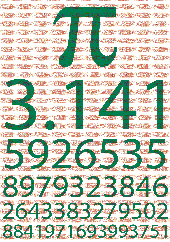3.1415926535897932384626433832795028841971693993751058209749
445923078164062862089986280348253421170679
821480865132823066470938446095505822317253594081284811174502
8410270193852110555964462294895493038196
442881097566593344612847564823378678316527120190914564856692
3460348610454326648213393607260249141273
724587006606315588174881520920962829254091715364367892590360
011330530548820466521384146951941511609
Pi is one of the most important mathematical constants, approximately equal to 3.14159.., and represents the ratio of any circle's circumference to its diameter in Euclidean geometry. The number also represents the ratio of a circle's area to the square of its radius, and appears in many other formulas from mathematics and science. Pi is an irrational number, which means that its decimal expansion 3.1415926535897932... never ends or repeats. Throughout the history of mathematics, much effort has been made to determine Pi, more accurately and understand its nature; fascination with the number has even carried over into culture at large.The actual Greek letter Pi, often spelled out "pi" in text, was adopted for the number from the Greek word for perimeter, probably by William Jones in 1706, and popularized by Leonhard Euler some years later. "pi" is usually pronounced as pie when referring to the constant, although the letter is properly pronounced pee otherwise. The constant is occasionally also referred to as the circular constant, Archimedes' constant (not to be confused with an Archimedes number), or Ludolph's number.
